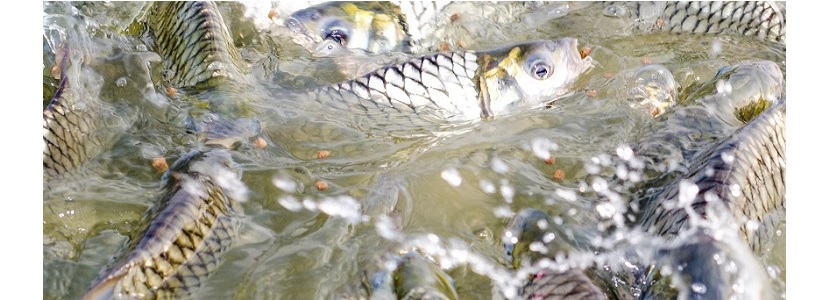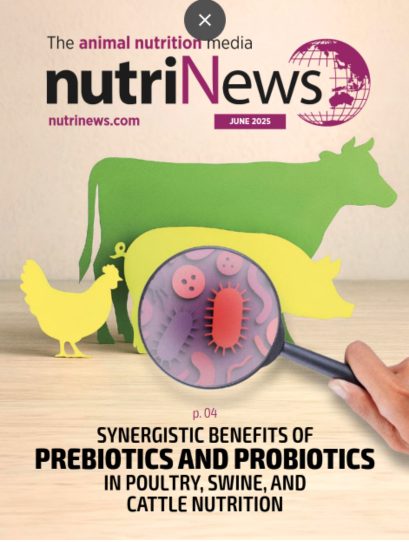Protein in Aquafeeds: Balancing Requirements, Sources, and Efficiency
Introduction
Protein is an essential macronutrient in fish nutrition, which serves as the fundamental building block for tissues, hormones, enzymes and other biologically active molecules. Proper dietary protein intake is crucial for fish growth, development, reproduction, and overall health.
This article delves into general aspects of dietary protein in fish nutrition, encompassing protein requirements, the importance of amino acids, various protein sources used in aquaculture feeds, factors influencing protein utilization, and advancements in protein utilization research.
Protein Requirements of Fish
Fish require dietary protein to obtain amino acids, which are the basic units that constitute proteins. The protein requirement of fish is influenced by several factors, including:
- Species: Different fish species have varying protein requirements depending on their natural feeding habits, metabolic rates, and growth patterns. Carnivorous fish like Rainbow trout (Oncorhynchus mykiss) generally have higher protein requirements than omnivorous or herbivorous species.
- Life Stage: Protein requirements change throughout the life cycle of fish. Larval and juvenile stages typically have higher protein requirements to support rapid growth and development, while adult fish may have lower requirements for maintenance.
- Environmental Factors: Water temperature, salinity, and oxygen levels can influence fish metabolism and consequently affect protein utilization.
- Dietary Energy Content: The dietary energy content influences protein utilization. If the diet is deficient in energy, fish will utilize protein for energy production rather than growth and other essential functions.
Generally, the dietary protein requirement for most fish species ranges from 30% to 55% of the dry diet.
Amino Acids: The Building Blocks of Proteins
Proteins are composed of amino acids, of which some are termed “essential” because fish cannot synthesize them or at a sufficient rate to meet their metabolic needs. These essential amino acids must be supplied through the diet. The essential amino acids for most fish species include:
- Arginine
- Histidine
- Isoleucine
- Leucine
- Lysine
- Methionine
- Phenylalanine
- Threonine
- Tryptophan
- Valine
In addition to these, some species may have specific requirements for other amino acids, such as cysteine, tyrosine, and proline.
Novel and Common Protein Sources in Aquafeeds
A variety of protein sources are used in aquafeed formulations, each with its own advantages and limitations:
- Animal By-Products: Animal by-products, such as poultry meal, meat and bone meal, and blood meal, can be used as protein sources in aquafeeds. However, their use is subject to regulations and concerns about disease transmission.
- Insect Meal: Insect meal, derived from insects such as black soldier fly larvae and mealworms, is a novel and sustainable protein source with a good amino acid profile and high digestibility.
- Fishmeal: Fishmeal has historically been the primary protein source in aquafeeds due to its high protein content, excellent amino acid profile, good palatability, and high digestibility. However, due to concerns about sustainability, fluctuating supply, and increasing costs, the use of fishmeal is being gradually reduced.
- Single-Cell Proteins (SCPs): SCPs, produced from microorganisms such as bacteria, yeast, and fungi, can be a valuable protein source for making aquaculture feeds.
- Plant-Based Proteins: Plant-based protein sources, such as soybean meal, canola meal, sunflower meal, and pea protein, are increasingly used as alternatives to fishmeal. However, these sources may have limitations in terms of amino acid profile, digestibility, and the presence of antinutritional factors (ANFs).
Efforts to improve protein utilization in aquaculture have led to the integration of novel ingredients and advanced nutritional strategies. One key approach is the use of alternative protein sources, such as insect meal, microbial proteins, and single-cell proteins, which offer promising solutions to reduce dependency on fishmeal while maintaining high digestibility and amino acid balance.
Importance of dietary protein in fish diets
Feeding the correct amount of dietary protein to fish is key, so most physiological processes can be performed and homeostasis can be maintained. Some of the functions of protein in fish include:
- Reproduction: Having the correct amount of protein during the yolk formation is crucial since it might determine the viability of the egg. Fish that are fed higher amount of protein tend to have better reproductive performance, including improved egg quality, egg size, egg maturation, and hatching.
- Disease Resistance: Nutrition has direct impacts on fish health and immunity. Providing adequate dietary protein will promote the synthesis of proteins and provide amino acids that are used as substrates for key metabolic pathways in charge of immune system cells formation.
- Growth: In fish, amino acids are preferentially used as an energy source rather than glucose. However, since protein is the most expensive nutrient in the diets the formulation must be focused based on maintenance requirements and growth. Protein in fish enhances new tissue formation which improves muscle development.
- Metabolic Functions: Proteins contribute to the formation of enzymes and hormones synthesis which catalyze biochemical reactions that assist in energy production and regulate several physiological processes such as growth and stress response, respectively.
Beyond its fundamental role in growth and metabolism, dietary protein significantly impacts the economic and environmental sustainability of aquaculture. Since protein is one of the most expensive components in fish diets, optimizing its inclusion levels is crucial to maintaining cost-effective production.
Excess dietary protein not only increases feed costs but also contributes to nitrogenous waste, leading to water quality deterioration and environmental concerns such as eutrophication. Therefore, precision in protein formulation is necessary to ensure that fish receive adequate levels to maximize growth without excess excretion.
Additionally, protein quality, including digestibility and amino acid balance, determines how efficiently fish utilize dietary protein. For instance, high-quality protein sources with balanced essential amino acids improve feed conversion ratios, reduce feed wastage, and enhance overall production efficiency.
Sustainable aquafeed development aims to balance economic viability with ecological responsibility by incorporating alternative protein sources that meet the nutritional needs of fish while reducing reliance on limited marine resources.
Factors Influencing Protein Utilization
Several factors can influence the efficiency of protein utilization in fish:
- Protein Quality: The amino acid profile and digestibility of the protein source significantly affect its utilization. Proteins with a balanced amino acid profile and high digestibility are more efficiently utilized.
- Dietary Energy Level: As mentioned earlier, if the dietary energy level is insufficient, fish will utilize protein for energy production, reducing its availability for growth
- Antinutritional Factors: Some protein sources, particularly plant-based sources, may contain antinutritional factors, such as trypsin inhibitors and lectins, which can impair protein digestion and utilization.
- Feed Processing: Feed processing techniques, such as extrusion and pelleting, can improve protein digestibility and utilization.
Advancements in Protein Utilization
Ongoing research is focused on improving protein utilization in fish through various strategies:
- Amino Acid Supplementation: Supplementing diets with limiting essential amino acids can improve protein utilization and growth performance.
- Enzyme Supplementation: Supplementing diets with exogenous enzymes, such as proteases, can enhance protein digestion and utilization.
- Feed Formulation and Processing: Optimizing feed formulation and processing techniques can improve protein digestibility and reduce nutrient losses.
- Genetic Selection: Selective breeding programs can be used to develop fish strains with improved ability to utilize plant-based proteins and other alternative protein sources.
Precision nutrition techniques, including amino acid supplementation, allow for better formulation of plant-based proteins to meet species-specific requirements. Advances in feed processing technologies, such as enzyme pre-treatment and extrusion, enhance protein digestibility and reduce the presence of anti-nutritional factors that can hinder nutrient absorption.
Moreover, genetic selection programs are being implemented to develop fish strains with improved protein efficiency, allowing them to better utilize plant-based diets. By combining these advancements, the aquafeed industry is progressively moving toward more sustainable and efficient feeding strategies that align with the increasing global demand for responsible aquaculture production.
Conclusion
Having the correct levels of protein in fish diets is crucial, since it plays essential roles in growth, development, and overall health. Understanding the protein requirements of different fish species, the importance of amino acids, the characteristics of various protein sources, and the factors influencing protein utilization is critical for developing efficient and sustainable aquafeed formulations. Ongoing research and advancements in protein utilization will contribute to improving the efficiency and sustainability of aquaculture production.












